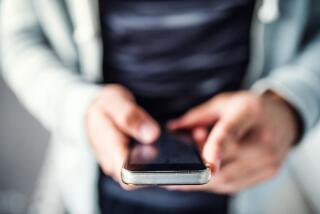The Sleepless Society
- Share via
To gain an edge, a New York mutual fund manager has a fax at the foot of his bed, its beep rousing him from sleep as it spits out opening and closing price stocks in Tokyo, London and Hong Kong. (He spares his wife by sleeping in headphones.)
* Mothers set up offices at home to maximize time with their children, rising early and going to bed late to complete their tasks.
* Increasing numbers of American workers--equipped with household computers, faxes and elaborate phone systems--are taking work home to finish late at night or on weekends.
* About 76% of Internet users ages 18 to 48 report that cruising cyberspace has whittled their sleep time to roughly six hours a night.
Social change and the evolution of technology has outpaced human biology, turning us into a culture that views sleep as expendable, nonproductive down time, says Stanley Coren, professor of psychology at University of British Columbia and author of “Sleep Thieves” (Free Press, 1996).
“We must ask whether human beings can keep up with and adapt to the new conditions we have imposed upon ourselves,” he says. “In less than 50 years, technology created the first computer, evolving to the laptop then to the Internet. The modem may have changed but our physiology hasn’t.”
Coren and other sleep specialists say we have entered a technological era that tempts us to abandon sleep and work around the clock. But on the scale of evolutionary time, that change occurred only a nanosecond ago, leaving our physiology flagging far behind.
“We evolved as a species that was supposed to go gather nuts and berries and hunt,” he says. “Our physiology is set for us to be active in the day and to sleep at night. Evolution programmed us for nine to 10 hours of sleep.” Human beings today are simply making demands on their bodies that conflict with their biological nature.
Most experts agree that the majority of Americans, who get seven and a half hours or less of sleep a night, are running on a sleep debt.
Sleep expert Dr. Mary Carskadon, a professor of psychiatry at Brown University, says that most people probably need an hour more sleep than they are getting. Coren espouses 10 hours of sleep for optimal functioning and for insurance against an occasional all-nighter. Other researchers claim that just over eight hours should suffice, once you’ve made up any cumulative sleep debt. (If you miss two hours of sleep for two days, the third day you’ll need more than 12 hours before you stabilize.)
In 1910, people were copping nine and a half to 10 hours of sleep a night. Studies of sleep patterns suggest that when left to more natural devices, human beings sleep longer. Seven researchers living in the Arctic during summer when the sun never sets got more sleep at first, then leveled off at 10 hours by the end of the fourth week.
Dr. Thomas Wehr, a psychiatrist and researcher at the National Institutes of Mental Health, found that with no time cues and 14 hours of darkness (as in winter), people slept 10 to 12 hours for 21 days (longer than most Americans’ vacations). After snoozing off their cumulative sleep debt (about 17.5 hours), they settled at eight hours and 15 minutes. Women seem to need an hour more, but is it not clear why, Wehr says.
“Our sleep is compressed so that we sleep less and consolidate it into industrial sleep--waking to alarms,” Wehr says. Test subjects would “sleep for a few hours, wake up in a quiet reverie almost always from REM sleep and reflect on dreams . . . sleep a few more hours and wake an hour before sunrise. This is the way our ancestors probably slept.”
*
What changed our natural sleep patterns most dramatically, experts agree, was the invention of the light bulb.
Inventor Thomas Edison--who boasted of sleeping only four hours a night, conveniently omitting his regular naps from his sleep quotient--hoped his invention would put an end to what he called a wasting away of time with sleep and the deterioration of health due to too much sleep.
With the light bulb, people were freed to ignore the natural restrictions of sunlight and season along with their own biological signals for sleep.
“There is no question that technology has caused us to be more sleep deprived,” says Richard Schwab, medical director of the Penn Center for Sleep Disorders at the University of Pennsylvania, who conducted the survey of Internet users. “Our physiology hasn’t changed, but what has is continuous light, multimedia, VCRs, telephones, 500 channels on TV, noise levels, a 24-hour lifestyle--and add to that the Internet, which makes users stay up later.
“The world is obviously on a 24-hour cycle and the Internet is up 24 hours a day. Then, when you are signed on, you get lost. There is no way to keep track of time.”
Such changes, mixed with the American work ethic and troubled economic times, have created a nation of walking sleep zombies. Since the 1970s, leisure time has been reduced by a third and people have increased their workweek by an average of 13 hours. Long sleepers are scorned as slothful and unmotivated. Short sleepers are viewed as somehow morally superior, strong enough of character to deny their personal needs and comforts for the greater good of company, family or cause. Sleep is looked at as less a human need than a human luxury.
“It has to do with our notion of a hero . . . think of the Hollywood stereotype, John Wayne,” Coren says. “He says you guys get some sleep and I’ll stand watch. Society really feels that the person who lays in bed is a sluggard, incompetent and lazy. But the guy who is out burning the midnight oil is the ambitious go-getter.”
*
The costs of scrimping on sleep are high and tragic. Most sleep experts blame disasters such as Three Mile Island, the Exxon Valdez and Chernobyl on overworked, sleep-deprived workers whose judgment was impaired by “a sleep fog.”
But nowhere are the ravages more apparent than on the highways. A 1994 report from the National Commission on Sleep Disorders Research reports that sleepiness accounted for 41.6% of all traffic accidents reported in 1988 (costing $37.9 billion). Those accidents caused 769,184 disabling injuries and 17,689 deaths.
Sleep-related errors cost the United States more than $56 billion a year, cause nearly 25,000 deaths and result in more than 2.5 million disabling injuries. Even losing an hour of sleep appears to wreak havoc. Coren conducted a 1991-’92 study of traffic accidents in Canada, finding that for one week following the shift to spring daylight savings time, accidents increased about 7%. Conversely, when clocks were turned back, he found traffic accidents decreased 7%.
But there are also more subtle effects. Wehr found that his well-rested study subjects reported experiencing “a clarity of mind” they had never before known, elevated mood and alertness. Body temperatures were also 3/10 of a degree warmer, the physiological explanation for clearheadedness. “There is a relationship between the brain function and body temperature,” Wehr says. “The brain functions better when the body is warmer.”
Research suggests that people perform better on math tests when they get adequate sleep. Other researchers claim that adequate sleep is critical to enabling our brain to renew and regenerate glycogen, a sugar fundamental to proper functioning. Still others suggest that losing as much as 10 hours of sleep a week might cause a person’s IQ to drop 15 points, Coren says. Sleep also appears to help the body maintain a strong immune system.
Carskadon found that college undergraduates who slept nine and a half hours showed improvement in daytime functioning and alertness. Similar results were discovered about adolescents, who typically get seven to seven and a half hours, largely because of TVs in their bedrooms. But sleep loss effects different people differently.
“Someone with a very undemanding life without a lot of relationships and demands may not notice it as much, but for someone who has a job that depends on vigilance--driving long distances or monitoring switches--it can be life threatening,” Carskadon says. “It also reduces the ability to cope with stress . . . to enjoy life and function well in relationships and all jobs.”
So familiar are we with feelings of sleepiness and fatigue, Carskadon says, that we blame our irritability on other things when inadequate sleep is the cause.
Sleep-deprived people say “I had a bad week, a stressful life and that is why I have a hair-trigger temper right now,” she says. “They forget what is like to function at their peak.”
To straighten things out, Coren says we should stop idolizing sleepless work fiends and start demonizing them. Once society starts viewing the sleep-funked person who nods off at the wheel or trips into work with toothpicks propping their eyes open as equally deplorable as the drunk driver, change can begin.
Then, Coren concludes, “maybe the rest of us can sleep more soundly.”






